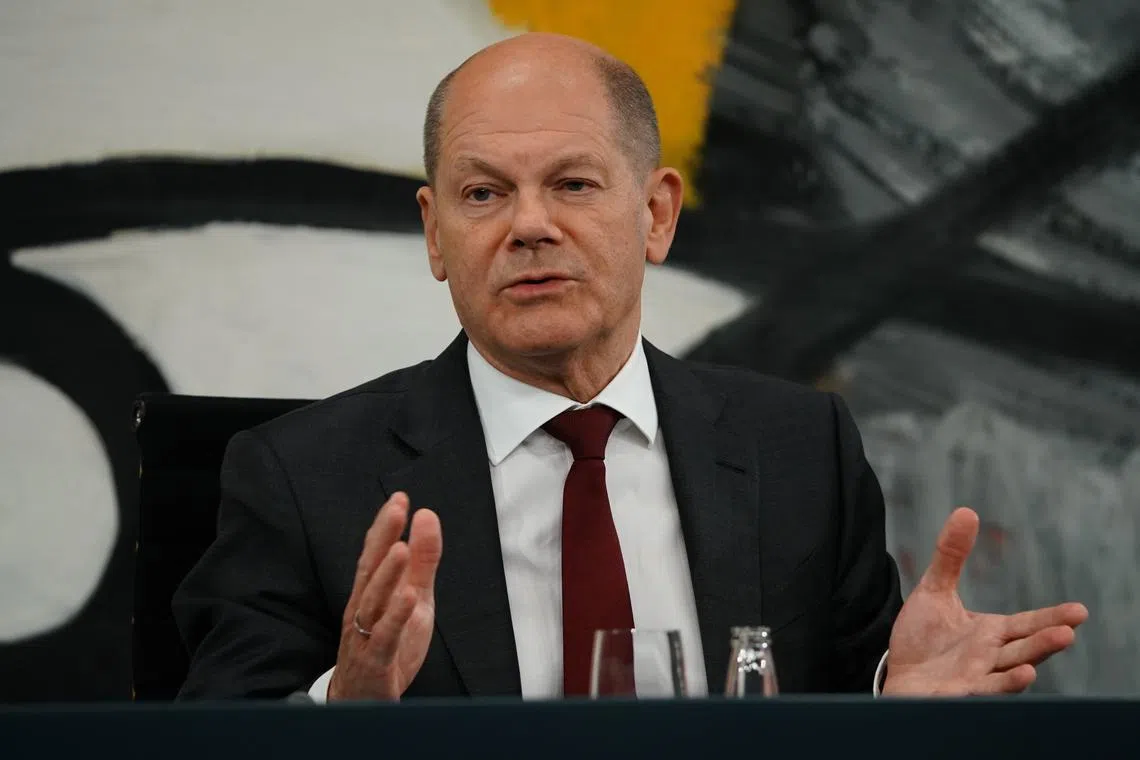Scholz vows not to ignore 'controversies' on China visit
Sign up now: Get insights on Asia's fast-moving developments

German Chancellor Olaf Scholz listed “difficult topics” he would raise, including the rights of ethnic minorities in Xinjiang.
PHOTO: EPA-EFE
Follow topic:
BERLIN - German Chancellor Olaf Scholz pledged on Wednesday not to ignore “controversies” during a high-stakes trip to China this week,
“We seek cooperation, when it is in the interest of both sides. We will not ignore controversies,” he wrote in the Frankfurter Allgemeine Zeitung newspaper, ahead of his visit Friday together with a business delegation.
Mr Scholz listed “difficult topics” that he would raise, including respect for civil liberties, the rights of ethnic minorities in Xinjiang
He will be the first European Union leader to visit China since late 2019, before the outbreak of the coronavirus pandemic, even as Beijing continues to pursue its tough zero-Covid policies.
But the leader of Europe’s largest economy has faced a backlash for undertaking the trip, and even members of his own coalition have raised concerns about Germany’s heavy reliance on increasingly authoritarian Beijing.
Such fears have grown after Germany was left exposed by its dependence on Russian gas imports – the country has been plunged into an energy crisis after Moscow slashed supplies as tensions soared over the Ukraine war.
Germany would continue to demand “reciprocity” in its relations with China, Mr Scholz said.
He said both sides were “far away” from that goal, listing areas including market access, legal certainty and protection of intellectual property.
Mr Scholz also sought to play down concerns that Germany was going it alone and seeking to look out for its own interests with the visit, despite the concerns of EU partners.
“When I travel to Beijing as German chancellor, then I do so also as a European,” he wrote of the visit, during which he will meet President Xi Jinping and Premier Li Keqiang.
Mr Scholz stressed he would not speak on behalf of the whole EU, but that German foreign policy could “only be successful” as part of a common European strategy towards China.
He also pointed out the last trip by a German leader was three years earlier.
“Such meetings have not been possible for a long time due to the Covid-19 pandemic and Beijing’s strict coronavirus policies,” Mr Scholz said. “That makes direct talks all the more important now.”
Washington has frowned on the visit, even though a senior United States state department official told journalists on Wednesday: “I think what we’ve seen over the last couple of years is increasing alignment between us and Europe on the challenges posed by China.”
The topic was likely to come up in a meeting between US Secretary of State Antony Blinken and his German counterpart Annalena Baerbock on Thursday on the sidelines of Group of Seven industrialised nations talks in the western city of Muenster.
Mr Blinken landed in Germany on Wednesday evening.
The United States has in particular raised concern over Germany allowing Chinese shipping giant Cosco to buy a stake in a port terminal in the northern city of Hamburg.
“The embassy was very clear that we strongly suggested that there be no controlling interests by China and as you see they adjusted the deal,” another high-ranking US diplomat said.
Ultimately, Mr Scholz defied calls from six ministries to veto the sale over security concerns, instead permitting the company to acquire a reduced stake.
The United States had cautioned Germany against allowing Cosco to obtain a controlling stake in the Hamburg port terminal, in a deal that has been seen as a gauge of how far Germany is willing to toughen its stance on its top trading partner.
Cosco made a bid last year to take a 35 per cent stake in one of logistics firm HHLA’s three terminals in Germany’s largest port, but the German coalition has been divided over whether to let the deal go ahead.
Germany approved a sale of 24.9 per cent of the terminal to Cosco last week, amid objections to the deal from the two junior partners in Mr Scholz’s three-way coalition. By pushing the stake under 25 per cent, the deal no longer officially requires Cabinet approval. AFP

